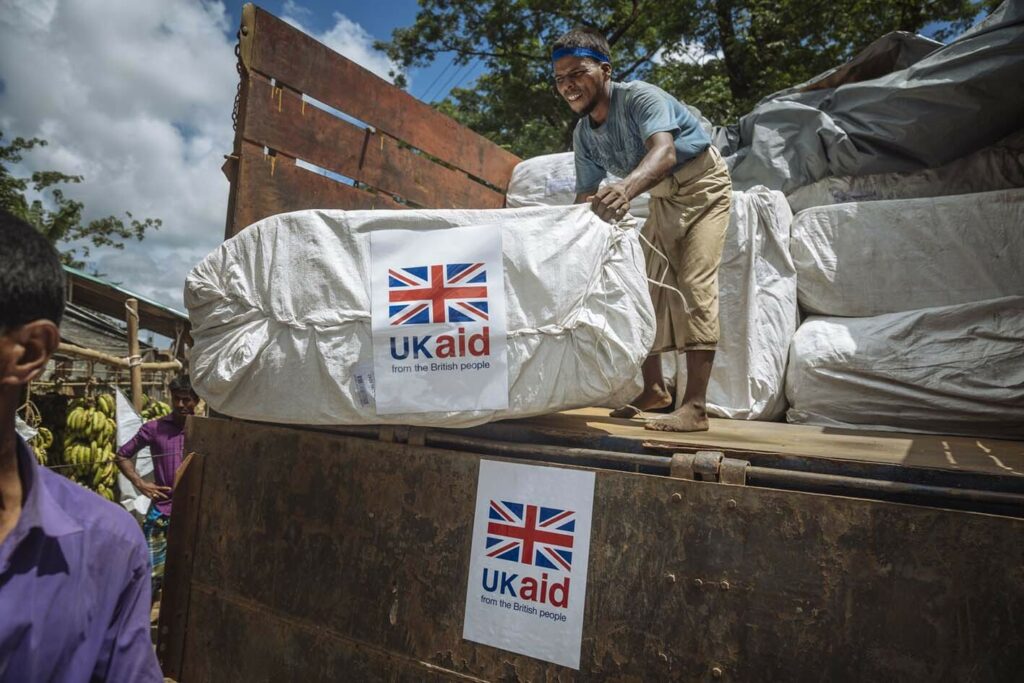Britain's Foreign Secretary Boris Johnson helps to load food supplies for treating malnourished children affected by the severe drought in Somalia, onto a cargo plane at the airport in Mogadishu, Somalia Wednesday, March 15, 2017. Johnson made a surprise visit to Somalia on Wednesday for talks with the country's new president as a worsening drought threatens millions of people in the Horn of Africa nation. (Karel Prinsloo/UNICEF
The United Kingdom has said it will cut 85% of its funding to the United Nations Population Fund (UNFPA) this year. In Zambia – where UNFPA provides at least 60% of contraception for the public sector – activists are bracing for possible birth control shortages.
Although Zambia is one of four countries in Africa with relatively liberal abortion laws, Mary Kubota – not her real name – knew terminating her pregnancy wasn’t an option her family would support when she got pregnant.
Instead, the teen turned to traditional medicine in hopes of ending the pregnancy. When that didn’t work, she looked to something more extreme, says Inonge Wina-Chinyama, a senior advisor on youth and disability for MSI Reproductive Choices in Lusaka, Zambia. (MSI Reproductive Choices was formerly known as Marie Stopes International.)
“She tried so hard to terminate the pregnancy,” Inonge Wina-Chinyama remembers, “that she crushed bottles and drank that … Her life would have been very different if she had that termination.”
About half of all 19-year-old women in Zambia are already mothers, according to the country’s latest demographic health survey, from 2018. Still, although almost 50% of women use some form of contraception, about one in five married women don’t – but say they wish they could.
MSI helps to bridge the gap, offering mobile clinics and teen-friendly services. But although MSI’s name is on the door of these clinics, it’s still UNFPA-bought birth control inside.
In late April, UNFPA’s leading donor – the UK government – said it would reduce funding for the agency by almost $180-million this year. The UK has blamed Covid-19’s strain on the public purse for the decision. Still, the proposed cuts are almost three times as severe as those imposed by former US President Donald Trump in 2017, based on US funding levels the previous year. Trump’s decision was part of a broad withdrawal of US support for sexual and reproductive health services globally, from which the world is still recovering.
Today, UNFPA buys reproductive health commodities – such as contraceptive implants and medicines to prevent maternal deaths – for 150 countries. In 26 nations, including Zambia, the UN agency is the major procurer of contraception.
In another 22 countries, it is the only buyer.
UNFPA has used these economies of scale to negotiate, for instance, rock- bottom prices for male condoms and even demand more environmentally friendly production processes, UNFPA Procurement Services Branch Chief Eric Dupont explains.
According to Sarah Shaw, the head of advocacy at MSI Reproductive Choices, the agency is a fundamental part of how the world provides contraception.
“Donors that fund us to deliver services will say, ‘We’re not going to fund you to procure your own commodities because that’s what UNFPA is good at,’ she says.
She adds: “UNFPA is still trying to figure out what these cuts are going to mean in countries but for us, it looks like there is a chance we might not get any more commodities for the rest of the year.”
Amos Mwale is the executive director for the nonprofit Centre 4 Reproductive Health and Education and says Zambia is already expecting that the UK decision will result in birth control shortages.
 The United Kingdom has said it will cut 85% of its funding to the United Nations Population Fund (UNFPA) this year.
The United Kingdom has said it will cut 85% of its funding to the United Nations Population Fund (UNFPA) this year.
Mwale says he hopes the UK will consider stretching proposed cuts over several years to allow countries to transition off its aid.
Back in Lusaka, Kubota delivered a healthy baby. Then she sought out MSI for contraception, becoming a peer educator before managing the organisation’s call centre for teens. She is now a third-year university student majoring in social work.
“Contraception allows girls to finish school, pursue their education, and space their kids…” says Wina-Chinyama. “We have seen the transformational power of contraception and the positive changes in a girl’s life when she has control over her body – and her future.”
This article appeared on The Continent, the new pan-African weekly newspaper designed to be read and shared on WhatsApp. Download your free copy here.